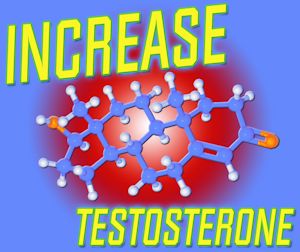 We know that a lot of what determines our health and longevity is based on genetics, but lifestyle factors, which include environmental factors, also play a huge role as well.
We know that a lot of what determines our health and longevity is based on genetics, but lifestyle factors, which include environmental factors, also play a huge role as well.
Obviously, if you have genes that tend to keep you slim and muscular for the most part, but you end up eating tons of fat and junk food, you’ll end up gaining weight.
On the other hand, some people have a tough time staying slim most of the time, but with the right diet and exercise, it’s not so difficult.
The same kind of example can be said about a man’s testosterone levels, especially as one ages. Both genetics and lifestyle factors play a role in how much a man’s testosterone levels decline as he ages and how bad the symptoms of low testosterone are for him.
It turns out that an environmental factor largely determines a man’s testosterone levels: where he grew up.
Study Shows Challenging Conditions Lower Future Testosterone Levels
 A recent study conducted by Durham University is suggesting that men who grew up in “challenging conditions” are more likely to have lower testosterone in later years than their peers who grew up in “healthier environments.” These challenging conditions include areas where infectious diseases run rampant.
A recent study conducted by Durham University is suggesting that men who grew up in “challenging conditions” are more likely to have lower testosterone in later years than their peers who grew up in “healthier environments.” These challenging conditions include areas where infectious diseases run rampant.
Published in Nature, Ecology, and Evolution, the hypothesis was that testosterone levels are not determined by genetics or race alone. One of their main catalysts for conducting the study was the fact that high testosterone levels can cause prostate enlargement or even prostate cancer.
The Durham University researchers want to see doctors who are screening for risk factors in men to consider the man’s childhood environment as well.
Testosterone Levels Linked to Energy Investment as a Child or Teenager
The subjects in the study were Bangladeshi men. The study found that Bangladeshi men who grew up and lived their whole lives in the United Kingdom had significantly higher levels of testosterone than their peers who grew up and lived in their homeland, Bangladesh.
In addition, the Britain Bangladeshis went through puberty at a younger age and were taller than the men who grew up solely in Bangladesh.
Specifically, 359 men were studied, using their saliva samples to determine testosterone levels.
The groups of men analyzed: men born and still residing in Bangladesh; Bangladeshi men who moved to London as children; Bangladeshi men who moved to London as adults; second-generation, United Kingdom (UK)-born men whose parents were Bangladeshi migrants and UK-born ethnic Europeans.
 The scientists theorize that the differences are due to energy investment, in that if more energy is being invested in fighting off infections or battling other harsh environmental factors (disease, poor nutrition, etc.) then there is less energy to be used in producing testosterone.
The scientists theorize that the differences are due to energy investment, in that if more energy is being invested in fighting off infections or battling other harsh environmental factors (disease, poor nutrition, etc.) then there is less energy to be used in producing testosterone.
Less stress and a healthier environment leave more energy for testosterone production.
The lead author of the study, Dr. Kesson Magid from the Department of Anthropology at Durham University in the UK, stated: “A man’s absolute levels of testosterone are unlikely to relate to their ethnicity or where they live as adults but instead reflect their surroundings when they were children.” Nature sure is surprising!
Health Effects of High or Low Testosterone Levels
Keeping your testosterone levels at the correct concentration in the body is no joke. Having too much or too little can wreak havoc on your body, men and women included.
Men with higher testosterone levels demonstrate increased muscle mass, risk of prostate disease or cancer, and more aggressive behavior. Low testosterone levels can cause chronic fatigue, low libido, depression, and erectile dysfunction.
Professor Gillian Bentley, the co-author, stated: “Very high and very low testosterone levels can have implications for men’s health and it could be important to know more about men’s childhood circumstances to build a fuller picture of their risk factors for certain conditions or diseases.”
The research also demonstrates that certain aspects of a man’s reproductive function and health remain malleable up to the age of approximately 19, being more flexible in early childhood.
In adulthood, it appears that men’s testosterone levels are no longer as heavily influenced by their surroundings (environment).
 As you can see, scientists at Durham University are concerned about men’s testosterone levels and the risk for adverse health effects – and so should you!
As you can see, scientists at Durham University are concerned about men’s testosterone levels and the risk for adverse health effects – and so should you!
If you have any concerns regarding your hormone levels and want to get your testosterone levels checked, consider giving us a call or filling out our contact form to get started. It’s super easy to find out what your levels are and whether you’re at risk for any adverse effects of high or low testosterone. Call us today!
Reference
Contact Us Today For A Free Consultation

- Cano's spokeswoman was client of Biogenesis [Last Updated On: January 25th, 2024] [Originally Added On: May 4th, 2013]
- Documents: Cano associate was client of clinic [Last Updated On: January 25th, 2024] [Originally Added On: May 4th, 2013]
- Sources: Cano associate was Biogenesis client [Last Updated On: January 25th, 2024] [Originally Added On: May 4th, 2013]
- Early Stage Testicular Cancer - Surveillance Is Best Follow-Up Strategy [Last Updated On: January 25th, 2024] [Originally Added On: May 18th, 2013]
- 2013 Endocrine Function Testing Market in Europe: Hospitals, Commercial Labs, Physician Offices, Ambulatory Care Centers [Last Updated On: January 25th, 2024] [Originally Added On: June 14th, 2013]
- Europe Endocrine Function Testing Market Studied by VPG in Cutting-Edge Report Now Available at MarketPublishers.com [Last Updated On: January 25th, 2024] [Originally Added On: June 18th, 2013]
- A More 'Natural' Version Of IVF Proves A Success [Last Updated On: January 25th, 2024] [Originally Added On: June 19th, 2013]
- Weight Loss Cure with Metabolic Cookbook - Video [Last Updated On: January 25th, 2024] [Originally Added On: July 12th, 2013]
- Weight Loss Drops - Are They A Scam? - Video [Last Updated On: January 25th, 2024] [Originally Added On: July 12th, 2013]
- Abbott Features Solutions to Help Labs Prepare for the Evolving Healthcare Landscape at the American Association for ... [Last Updated On: January 25th, 2024] [Originally Added On: July 30th, 2013]
- How Testicular Cancer Is Diagnosed | Testicular Cancer - Video [Last Updated On: January 25th, 2024] [Originally Added On: August 11th, 2013]
- 2014 Opportunities in the US Clinical Chemistry and Immunodiagnostics Markets [Last Updated On: January 25th, 2024] [Originally Added On: September 27th, 2013]
- Serie A - Doping ban overturned on cancer sufferer Acerbi [Last Updated On: January 25th, 2024] [Originally Added On: January 8th, 2014]
- Health Highlights: Jan. 8, 2014 [Last Updated On: January 25th, 2024] [Originally Added On: January 8th, 2014]
- Testosterone Replacement Therapy [Last Updated On: December 9th, 2023] [Originally Added On: January 19th, 2014]
- Paid Hepatitis C Clinical Trial Now Enrolling at Avail Clinical Research near Orlando, Florida; Accepting M/F Patients ... [Last Updated On: January 25th, 2024] [Originally Added On: January 22nd, 2014]
- Luteal Phase: The Uterine Lining Phase - Video [Last Updated On: January 25th, 2024] [Originally Added On: April 10th, 2014]
- Doping case against Acerbi dismissed [Last Updated On: January 25th, 2024] [Originally Added On: April 15th, 2014]
- Drugs that Cause Gynecomastia [Last Updated On: January 25th, 2024] [Originally Added On: May 14th, 2014]
- Illegal Online Meds Targeted in Worldwide Crackdown, FDA Says [Last Updated On: January 25th, 2024] [Originally Added On: May 24th, 2014]
- Biogenesis' Bosch surrenders in PEDs case [Last Updated On: January 25th, 2024] [Originally Added On: August 5th, 2014]
- Duchess of Cambridge 'hugely disappointed' after being forced to pull out of yet another engagement due to morning ... [Last Updated On: January 25th, 2024] [Originally Added On: October 1st, 2014]
- Kate, Duchess of Cambridge dazzles in baby blue gown at the Natural History Museum [Last Updated On: January 25th, 2024] [Originally Added On: October 22nd, 2014]
- 'They're poisoning us'. How religious leaders are hindering vaccination programmes across the world [Last Updated On: January 25th, 2024] [Originally Added On: November 14th, 2014]
- Poor prognosis germ-cell tumours are only cured in about half of patients. We aimed to assess whether treatment ... [Last Updated On: January 25th, 2024] [Originally Added On: November 23rd, 2014]
- Nursing a Grudge [Last Updated On: January 25th, 2024] [Originally Added On: January 22nd, 2015]
- Hormone Levels in Men - Testosterone Injections [Last Updated On: November 30th, 2021] [Originally Added On: September 9th, 2016]
- Human Growth Hormone May Actually IMPROVE Quadricep Strength After Reconstruction of Torn ACL [Last Updated On: September 23rd, 2024] [Originally Added On: June 22nd, 2020]
- Six Ways to Feel Good and Balance Your Hormones at the Same Time! [Last Updated On: January 25th, 2024] [Originally Added On: September 24th, 2020]
- Both High and Low Levels of Testosterone Correlate With Cardiovascular Issues in Men [Last Updated On: September 27th, 2024] [Originally Added On: April 14th, 2021]
- Breaking News: Testosterone May Be the Answer to Autoimmune Diseases [Last Updated On: August 24th, 2024] [Originally Added On: May 14th, 2021]
- Non-Stop Cravings for Protein? Blame it on Your Gut Hormones! [Last Updated On: September 13th, 2024] [Originally Added On: May 21st, 2021]
- Testosterone Therapy Could Help Quell Your Asthma Attacks [Last Updated On: September 12th, 2024] [Originally Added On: June 20th, 2021]
- BPA Here, BPA There, What’s the Reason for the Scare? [Last Updated On: September 16th, 2024] [Originally Added On: June 29th, 2021]
- Low Testosterone Linked to Depression and Suicidal Ideation [Last Updated On: August 25th, 2024] [Originally Added On: July 5th, 2021]
- It’s True: Men Today Have Less Testosterone Compared to Men a Generation Ago [Last Updated On: September 19th, 2024] [Originally Added On: July 13th, 2021]
- Losing Weight with Baratric Surgery Reverses Low Testosterone [Last Updated On: October 2nd, 2024] [Originally Added On: February 8th, 2022]
- Do Larger Testicles Make More Testosterone? [Last Updated On: July 24th, 2024] [Originally Added On: May 3rd, 2022]
- Fact or Myth: Have Testosterone Levels Really Dropped by 50% Just in the Past Two Decades? [Last Updated On: August 14th, 2024] [Originally Added On: June 4th, 2022]
- Another Analysis Shows No Cardiovascular Risks With Testosterone Therapy [Last Updated On: October 6th, 2024] [Originally Added On: November 27th, 2022]
Word Count: 791





















